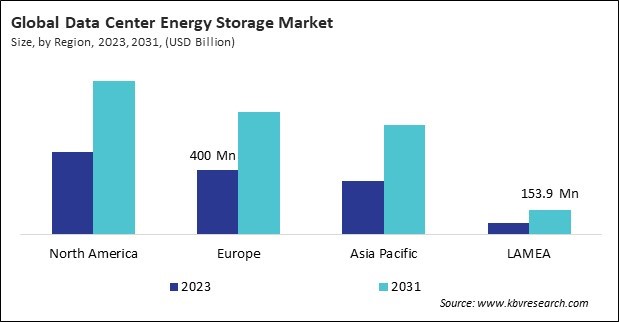According to a new report, published by KBV research, The Global Data Center Energy Storage Market size is expected to reach $2.6 billion by 2031, rising at a market growth of 8.8% CAGR during the forecast period.
The expansion of hyperscale data centers, which support large-scale operations for cloud service providers such as Amazon Web Services (AWS), Google Cloud, and Microsoft Azure, is driving the adoption of energy storage. Hyperscale data centers require enormous amounts of energy, and efficient energy management solutions like energy storage are essential for maintaining their operations at scale. Using energy storage helps mitigate the risk of power interruptions and enhances energy resilience in these vast facilities.

The Tier 3 segment led the maximum revenue in the Global Data Center Energy Storage Market by Type in 2023, thereby, achieving a market value of $1.1 billion by 2031. This dominance can be attributed to the balance tier 3 data centers strike between reliability, performance, and cost-effectiveness. These data centers are designed to offer high availability with an uptime of 99.982%, meaning they can tolerate about 1.6 hours of downtime annually.
The BFSI segment is growing at a CAGR of 7.6 % during the forecast period. The critical nature of financial transactions and the need for constant availability of financial data necessitate robust and reliable energy storage solutions in this sector. Financial institutions rely heavily on real-time data processing and analytics to manage transactions, prevent fraud, and comply with regulatory requirements.
Full Report: https://www.kbvresearch.com/data-center-energy-storage-market/
The North America region dominated the Global Data Center Energy Storage Market by Region in 2023, and would continue to be a dominant market till 2031; thereby, achieving a market value of $959.5 million by 2031. The Europe region is anticipated to grow at a CAGR of 8.6% during (2024 - 2031). Additionally, The Asia Pacific region would witness a CAGR of 9.4% during (2024 - 2031).
By Type
By Application
By Geography
 Unique Offerings
Unique Offerings